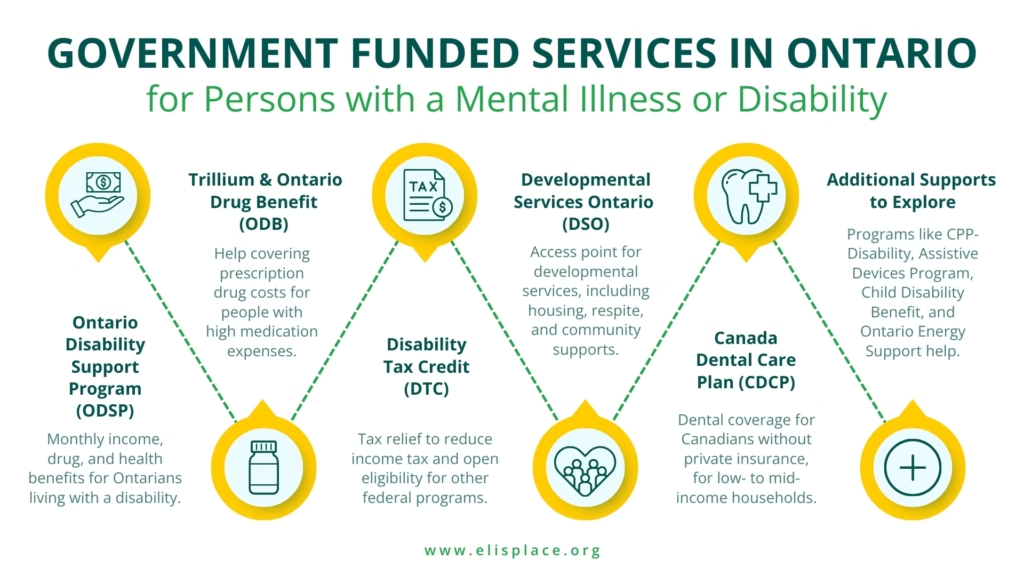Importantly, even if someone is not receiving the Ontario Disability Support Program (ODSP) or the Canada Pension Plan Disability Benefit, they may still qualify for other forms of support, such as the Trillium Drug Program, the Ontario Drug Benefit, or disability-related tax credits. These programs are designed to ensure that financial strain does not prevent people from accessing the care, medications, or services they need. For a broad overview, resources outlining the financial assistance available to people with disabilities can serve as a starting point. Still, it is equally important to understand the details of each program.


Ontario Disability Support Program (ODSP)
The Ontario Disability Support Program provides income support to people with disabilities who are in financial need. ODSP helps cover basic living expenses such as food and housing, while also offering health benefits, including prescription drug coverage and dental care.
To qualify, applicants must be at least 18 years old, live in Ontario, and have a disability expected to last more than one year that significantly limits their ability to work or care for themselves. Financial eligibility is also assessed.
The application process involves completing forms online or in person at a local ODSP office. Applicants undergo a financial review and must provide medical documentation from a healthcare provider. While the process may feel lengthy, ODSP remains the backbone of disability support in Ontario and often serves as a gateway to other benefits.

Prescription Drug Coverage:
Trillium & Ontario Drug Benefit (ODB)
Medication can be one of the most significant costs for people living with chronic illness or disability. Thankfully, Ontario offers two main programs for prescription drug coverage.
The Trillium Drug Program helps residents whose prescription drug costs are high relative to their household income. Anyone with an OHIP card can apply, provided they are not already fully covered by another program. The Ontario Drug Benefit automatically provides prescription coverage for eligible groups, such as seniors, children and youth in care, and people on ODSP.
Together, these programs cover about 5,000 prescription drugs, as well as an additional 1,000 through the Exceptional Access Program under specific circumstances. For those applying to Trillium, forms are available here.

Developmental Services Ontario (DSO)
For adults with developmental disabilities, Developmental Services Ontario connects individuals to provincial programs such as housing supports, community participation opportunities, and respite services for caregivers. This is particularly important for individuals living with both a developmental disability and a mental illness.
To qualify, applicants must be Ontario residents, 18 or older, with documentation confirming an intellectual disability that began before age 18. The application process involves assessments and supporting documents from healthcare professionals or schools. Though sometimes lengthy, DSO remains the central access point for developmental disability services in Ontario.

Disability Tax Credit (DTC)
The Disability Tax Credit is a non-refundable credit designed to reduce the income tax burden for individuals with a mental or physical disability. Applicants must have a prolonged impairment lasting at least 12 months, verified by a healthcare professional.
The process involves completing the T2201 Disability Tax Credit Certificate and submitting it to the Canada Revenue Agency for approval. If granted, the credit can be applied retroactively for up to ten years, potentially resulting in significant tax refunds. Approval also opens the door to other benefits, such as the Registered Disability Savings Plan and caregiver credits. Beginning in July 2025, approval for the DTC will also make individuals eligible for the new Canada Disability Benefit, a federal income supplement.

Canada Dental Care Plan (CDCP)
Oral health is often overlooked in disability care, but untreated dental issues can have serious health consequences. The Canada Dental Care Plan provides dental coverage for Canadians without private insurance whose household income is under $90,000. Applicants must have filed a tax return for the previous year.
Covered services include exams, x-rays, cleanings, fillings, root canals, and dentures, as outlined here. Applications are submitted through the CRA’s My Account, and coverage is managed by Sun Life Financial.

Additional Supports to Explore
Beyond the core programs, other supports can make daily life more manageable. The Assistive Devices Program helps cover the cost of mobility aids, hearing aids, and similar equipment. The CPP Disability Benefit provides income to those who contributed to the Canada Pension Plan but can no longer work due to disability. For households facing high utility costs, the Ontario Energy Support Program offers a monthly credit on electricity bills.

Don’t Let Paperwork Stop You
The greatest barrier to accessing these supports is often not eligibility, but the paperwork required. Many people give up before completing applications. Yet support is available to help with this process.
For individuals and families, accessing disability and mental health supports can feel like a maze of forms, assessments, and requirements. But it is important to remember that no one needs to go through it alone. Primary care providers, social workers, occupational therapists, and peer support workers can provide guidance. Resources from the CMHA and Mental Health Commission of Canada can connect people with local advocates.
Each program, whether ODSP, Trillium, or the Disability Tax Credit, represents not just financial relief but also a step toward stability, dignity, and hope. By reaching out and exploring what is available, individuals can break down barriers and build a future where care and connection are within reach.

Eli’s Place Communications Team
Our Eli’s Place blogs are developed & written by the Eli’s Place Editorial Team — a collaboration between staff and volunteers committed to raising awareness about serious mental illness in Canada. We aim to inform, inspire, and engage with readers who care about mental health and recovery.
- Eli’s Place Communications TeamJanuary 21, 2026








